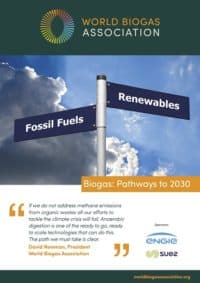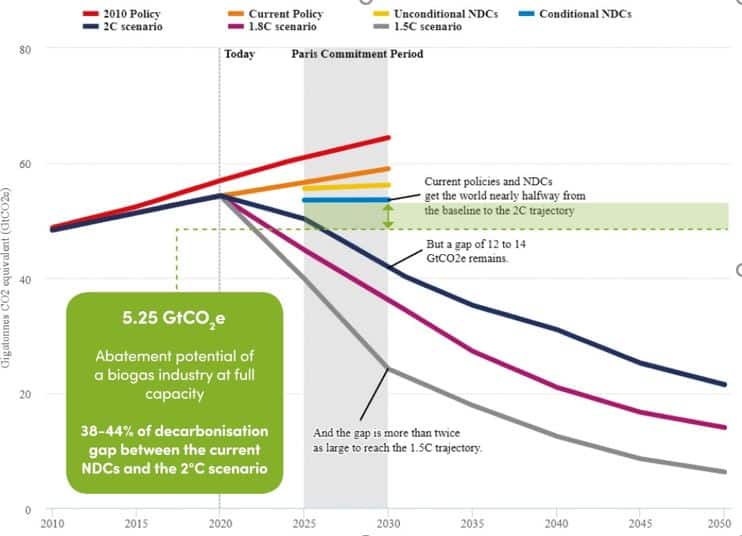
“Appropriate management of all organic wastes must be enabled NOW if the world is to meet Paris Agreement targets”, says global biogas trade body in landmark report
- The World Biogas Association (WBA) today launched a report highlighting the opportunity to rapidly cut the methane emissions from the huge volume of organic wastes generated annually by human activity, using the knowledge and technology that is available today.
- Human activity currently generates 105bn tonnes of organic wastes every year, which are releasing harmful gases into the atmosphere, particularly methane – a gas 85 times more harmful than CO2 over a 20-year period. Reducing methane emissions is therefore a priority to address the climate emergency and meet the 2030 deadline.
- Biogas: Pathways to 2030 explores how, by 2030, appropriate management of all organic wastes can enable
- a reduction in the amount of these wastes, especially food waste, which would itself cut global emissions by 3%, and;
- the transformation of the unavoidable organic wastes into valuable bioresources, which would cut global greenhouse gas emissions by a further 10%.
- Currently only 2% of the world’s organic wastes are effectively treated and recycled. These organic wastes are best recycled through anaerobic digestion (AD), a process which produces green energy, biofertilisers and other bio-products essential for the development of a sustainable circular economy. WBA calls for governments to ensure ALL unavoidable organic wastes are captured and treated through AD.
- Recycling of unavoidable organic wastes through AD not only contributes towards climate change mitigation but also, by improving soils, air quality and sanitation worldwide, towards the delivery of many of the UN’s Sustainable Development Goals.
- Biogas: Pathways to 2030 makes clear recommendations on how to deploy AD around the world, providing governments with a toolkit of measures that will enable the biogas industry to deliver carbon savings and cut the current shortfall identified by the UN in the capacity of Nationally Determined Contributions (NDCs) to meet Paris Agreement targets by over a quarter.
- There is now less than a decade left to deliver on the Paris Agreement objectives, and current NDCs only deliver 1% of the 45% reduction in GHG emissions needed to keep global warming to below 2°C by 2030. Implementing those measures is therefore critically urgent.
29 March 2021 – The World Biogas Association (WBA) today launched its latest report: Biogas: Pathways to 2030, which provides a comprehensive review of how management of unavoidable organic waste through anaerobic digestion (AD) could deliver by 2030 a 10% reduction in global greenhouse gas (GHG) emissions – and in particular methane, which is 85 times worse than carbon dioxide over a 20-year period (1).
Human activity generates 105bn tonnes of organic wastes (food waste, sewage and garden wastes, food and drink processing wastes, and farm and agricultural wastes) annually by human activity. By managing these properly, we can
(a) reduce the quantity produced – delivering a 3% reduction in GHG emissions- and
(b) treat the GHG-emitting balance – removing a further 5% of emissions, and then
(c) recycle this balance through AD into alternatives to fossil-based products – delivering a further 5% reduction in GHG emissions
Once all avoidable waste is prevented, the remaining unavoidable waste can be recycled into green energy for power, heat and transport as well as biofertilisers for agriculture, bio-CO2 and other valuable bio-products. However, only 2% of those wastes are currently being effectively managed.
“By mapping out how AD and biogas could help countries to dramatically cut their greenhouse gas emissions, especially methane, over the next decade and beyond, this report aims to put humanity back on track to deliver on the ambitions of both the Paris Agreement and UN Sustainable Development Goals.” says David Newman, President of WBA.
“The report highlights the fundamental part our industry can play in achieving net zero and in creating a circular, sustainable and environmentally-friendly economy for both high- and low- income countries. Ahead of COP26, these countries should integrate AD and biogas into their NDCs if we are to successfully address the climate emergency. And they need to do so urgently.”
Charlotte Morton, WBA Chief Executive, added: ” Current nations’ climate plans deliver a hopeless 1% of the 45% greenhouse gas emissions reductions the Intergovernmental Panel on Climate Change says is required to keep climate warming to below 2C. Treating the world’s unavoidable organic wastes through AD would help meet over one quarter of this alarming shortfall (2). We cannot afford to miss such an opportunity and need to act NOW to ensure that AD and biogas can fully play their part in addressing climate change.”
Key recommendations to biogas industry stakeholders, governments and policymakers around the world include:
- The global AD and biogas industry must come together to develop and adhere to best-in-class principles and norms associated with responsible investing (including good governance and supply chain transparency). This follows up on the Biogas Industry and Climate Change Commitment Declaration of November 2019 in which the industry pledged to put all its technical, financial and human resources towards delivering on the global GHG reductions ambition. The Declaration was presented to the UNFCCC at COP25.
- The global AD and biogas industry should actively contribute to science-based thought leadership around carbon pricing, accounting and reporting, and adopt methods that successfully monitor and verify the sustainability and environmental safety of its processes.
- Governments should include the collection and recycling of organic wastes among their target instruments when reviewing their Nationally Determined Contribution to the Paris Agreement.
- Governments should not simply measure biogas in terms of energy, but in the overall beneficial outcomes across a whole range of environmental services and wider benefits to society.
- Policymakers should facilitate the development of a market for the environmental benefits of biogas, while enabling the industry to become independent of direct subsidy. This should be accompanied by the balanced removal of all direct support for the fossil industry to ensure there is a level playing field before any subsidies for biogas are removed.
- Policymakers should introduce national, regional and finally global carbon trading mechanisms to create an effective market for the climate benefits of biogas. The scope and methodology of these mechanisms must cover GHG emissions as well as methane capture and carbon sequestration from agriculture and from organic wastes generated by human activity.
Follow WBA’s campaign to 2030, as they traverse from Birmingham, Paris, Madrid and the world. The #pathwaysto2030 campaign hub links to all the reports, videos and press releases at www.worldbiogasassociation.org/pathwaysto2030
(1) While a carbon gas, methane caused by human activity is identified as being responsible for ~20% of global warming. Addressing methane holds the key to success as it has a greater forcing effect over the first 20 years in the atmosphere. While methane typically stays in the atmosphere for 35 years, its global warming potential is far greater than CO2. As a consequence, one tonne of methane released over the next decade is equivalent to releasing 85 tonnes of CO2. As we have 10 years to act, tackling methane is the key to achieving net zero.
(2) To be on track to limit global warming to below 2C by the end of the century, the IPCC say a 45% cut in global greenhouse gas (GHG) emissions against 2010 levels is required by 2030. An interim NDC Synthesis Report for the UNFCCC shows pledges currently amount to 1%. AD’s impact is highlighted in green in the chart below.

Read the Executive Summary
Read the Full Report
– ENDS –
For further information, contact:
Jocelyne Bia
Senior Communications Consultant – World Biogas Association
email: jbia@worldbiogasassociation.org; t: 00 44 7910 878510
Notes to editors
About the World Biogas Association
Launched at COP22 in Marrakesh in 2016, the World Biogas Association is the global trade association for the biogas, landfill gas and anaerobic digestion (AD) sectors, and is dedicated to facilitating the adoption of biogas globally. It believes that the global adoption of biogas technologies is a multi-faceted opportunity to produce clean, renewable energy while resolving global issues related to development, public health and economic growth. www.worldbiogasassociation.org @wbatweets

